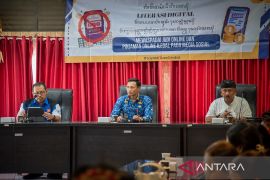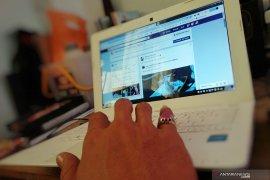Jakarta (ANTARA) - International Telecommunications Union (ITU), Badan PBB yang mengurus teknologi dan jaringan, berpendapat anak-anak lebih sering menghabiskan waktu di dunia maya sejak pandemi COVID-19.
Keadaan tersebut dinilai mengkhawatirkan, karena sejak pandemi, anak-anak mengakses internet di usia muda dan berisiko mengalami perundungan di dunia maya.
"Banyak anak yang terhubung dalam jaringan lebih awal dari keinginan orang tua mereka, dalam usia yang lebih muda dan tidak punya keterampilan yang dibutuhkan untuk melindungi diri mereka, apakah dari pelecehan daring atau perundungan," kata salah seorang direktur ITU, Doreen Bogdan-Martin, dikutip dari Reuters, Rabu.
Baca juga: KPPAD Bali sediakan layanan pengaduan perlindungan anak secara daring
Lembaga yang berbasis di Jenewa, Swiss itu memperkirakan ada 1,5 miliar anak yang terpaksa tidak sekolah karena penutupan wilayah demi menghentikan penyebaran Virus Corona.
Sebagai ganti waktu bersekolah, mereka belajar secara daring, juga untuk bersosialisasi dan melakukan hobi mereka.
ITU juga menyoroti waktu yang dihabiskan anak-anak untuk online sehari-hari selain untuk belajar, misalnya bermain 'game' atau bersosialisasi.
Baca juga: Seto Mulyadi : Hadapi COVID-19 dengan Gembira
ITU berencana mempercepat peluncuran panduan untuk melindungi anak-anak di dunia maya dalam waktu dekat.
Selain itu, lembaga tersebut juga menggarisbawahi pandemi ini menciptakan "kesenjangan digital", yaitu ada orang-orang yang memiliki akses internet dan ada yang tidak.
Internet berpengaruh terhadap kegiatan belajar selama pandemi COVID-19. Jika tidak ada internet, kegiatan belajar anak akan terganggu.
Baca juga: Cara agar anak tak berlebihan gunakan internet saat PSBB
Bogdan-Martin menyatakan ITU sedang bekerja dengan lembaga PBB untuk anak-anak agar bisa berkomunikasi lewat jaringan 2G.
ITU memperkirakan ada 3,6 miliar orang yang tidak punya akses ke internet, juga banyak orang yang harus mengeluarkan banyak uang untuk tersambung ke internet atau koneksi mereka tidak bagus.
---
https://www.reuters.com/article/us-healthcare-coronavirus-technology/children-at-risk-as-pandemic-pushes-them-online-warns-u-n-agency-idUSKBN22H2EZ
Children at risk as pandemic pushes them online, warns U.N. agency
Emma Farge
3 MIN READ
GENEVA (Reuters) - Children are accessing the internet at a younger age, spending longer online and are at greater risk of cyber bullying as the COVID-19 pandemic keeps them at home, a U.N. agency said on Tuesday.
The Geneva-based International Telecommunications Union (ITU) estimated that 1.5 billion children are out of school due to lockdown measures to stop the spread of the new coronavirus, forcing them to go online for their schooling but also their social lives and hobbies.
“Many children are coming online earlier than their parents had intended, at much earlier ages, and without the necessary skills to protect themselves whether it is from online harassment or cyber bullying,” Doreen Bogdan-Martin, an ITU director, told an online briefing.
“The other thing is the length [of time] children are spending online whether simply for schooling or for entertainment, gaming, socialising... after their learning is completed,” she said.
The ITU, which develops standards and guidelines, is trying to accelerate the launch of recommendations for child protection online and release them over the next fortnight, Bogdan-Martin added.
Doctors and psychologists have already warned about the impact of the outbreak and said the anxiety-inducing spread of the virus may be traumatic for children.
The ITU noted, however, that the internet is a “vital digital lifeline”, and the pandemic has highlighted the so-called “digital divide” between those with and without internet access.
ADVERTISEMENT
A lack of internet access can be devastating for children’s education, Bogdan-Martin said, adding the ITU was working with the U.N. children’s fund to communicate via 2G technology.
“If there’s one thing that the unprecedented events of the last few months have dramatically illustrated it is the vital and essential importance of connectivity,” she said.
A total of 3.6 billion people do not have access to the internet, the agency estimates, and many of those that do are paying too much or have poor connections.










